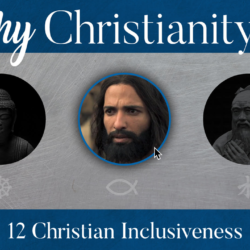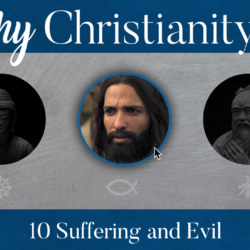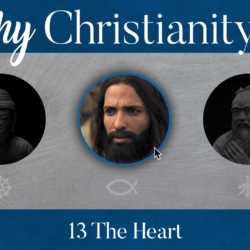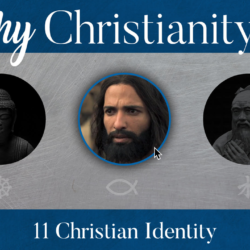Tribalism is a major problem in our society today. If we’re honest, tribalism is a major problem in Christianity today. If I’m really honest, I have to admit that tribalism is a major problem in me today. Do you feel it too? Are you tempted to blow your ideological, theological, or political enemies out of the water when they say something ignorant or obviously wrong? Are you tempted to lump people into a group, label them, and stereotype them? As our society has increasingly become polarized on issues from the environment to immigrants to sexuality to wearing masks we must resist the temptation to get sucked into tribal thinking. In the end, we are the Church with a commission to reach outsiders with God’s love. How can we do that if we circle the wagons, or worse, cast stones?
Listen to this episode on Spotify or Apple Podcasts
—— Links ——
- Check out these other podcast episodes about culture and polarization
- Support Restitutio by donating here
- Designate Restitutio as your charity of choice for Amazon purchases
- Join our Restitutio Facebook Group and follow us on Twitter @RestitutioSF
- Leave a voice message via SpeakPipe with questions or comments and we may play them out on the air
- Intro music: Good Vibes by MBB Attribution-ShareAlike 3.0 Unported (CC BY-SA 3.0) Free Download / Stream: Music promoted by Audio Library.
- Who is Sean Finnegan? Read his bio here.







An interesting sermon, Sean, that may provoke wider questions for people :
1. If God can forgive sins, can He also forgive certain Christian’s false doctrines ?
2. Is it possible that many people may be much better Christians, than they are theologians ?
3. What is the absolute minimum amount of doctrine necessary for belief, in order to be a Christian ?
I believe to cover the topic completely one must ultimately address the Scriptural passages which are used (sometimes legitimately) to FORM barriers within the church: those that admonish regarding those that walk disorderly, cause divisions and offences, etc. Covering this uncomfortable topic, in particular enumerating the various pitfalls and abuses in their application when necessary, could both help the church avoid unecessary schism, while also protecting the church from the polluting influence of genuinely ungodly company. Please consider adding such a follow-on discussion to your input stack of future topics.
Isn’t the New Testament pretty sufficient and explicitly clear on these things, Jim ? (e.g. Gal. 5:13-26; 1 Cor. chaps. 5-6; Romans 14:1-23; 2 Thess. 3:14-15; Jude 17-19; Romans 16:17; et al).
Jim makes a solid point.
Also worth considering in the context of tribalism: Jesus’ disciples included both a zealot and a tax collector.
Hi, Jeff;
It’s probably more accurate to say that Jesus’ disciples included an ex-Zealot and an ex-Tax Collector. Their new lives as followers of Jesus, and as itinerant preachers (Luke 9:1-6) were financed by certain women followers of the Lord (Luke 8:1-33).
Furthermore, Acts 15. There are Pharisees actively forcing circumcision upon people according to a false doctrinal belief that a man cannot be saved unless he does so. If you were in the room with such a person, would you shy away from calling him a brother? Peter didn’t. And Luke called them believers. Are we setting the bar too high? The whole situation is a lesson against tribalism.
Hi, Jeff,
The matter of whether Gentile Christians must be circumcised to comply with the Mosaic Law was exhaustively settled at the council of Jerusalem (cf. Acts 15:1-35). Nevertheless, certain teachers continued to insist that Gentile Christians must be circumcised. The apostle Paul calls such people ‘false brethren’ (Gal. 2:4) who are guilty of preaching a false Gospel (Gal. 1:6-9). Church members who stray into a lifestyle at variance to new testament morality and godly teaching are to be warned (2 Thessalonians 3:14-15; Matt. 18:15-18), and if necessary, ultimately expelled from the church (1 Cor. 5:1-13). This action is in the best interests of both the offender, and of the Church.
I too have read about ‘tribalism’ and the damage that it does, because it is about protecting and enriching one’s own group at the expense of others.
What is not so recently spoken about is groups that seek to enrich others.
Groups have been the predominant way that society has grown, a nation grows stronger when its tribes take on the national identity over that of their tribe. Then it is up to that nation to behave responsibility because it has do much greater innovative, commercial, military power etc. And it can achieve great things.
Groups can be a power for good or bad.
Groups can choose to look inward or outward.
The body of Christ should be such a positive group, following our lord’s example. Although there is always the question as to where the boundaries should be. But we all will agree there should be some, or we too become universal Unitarians.
Hi, David :
A Christian can never take on a national tribal identity that interferes with, or compromises, their identity in Christ – Who is Head of the invisible Church (Romans 6:2-11; Ephesians 1:19-23, Col. 3:1-3). We have here no earthly city (Hebrews 13:14), nor any earthly country (Hebrews 11:14).